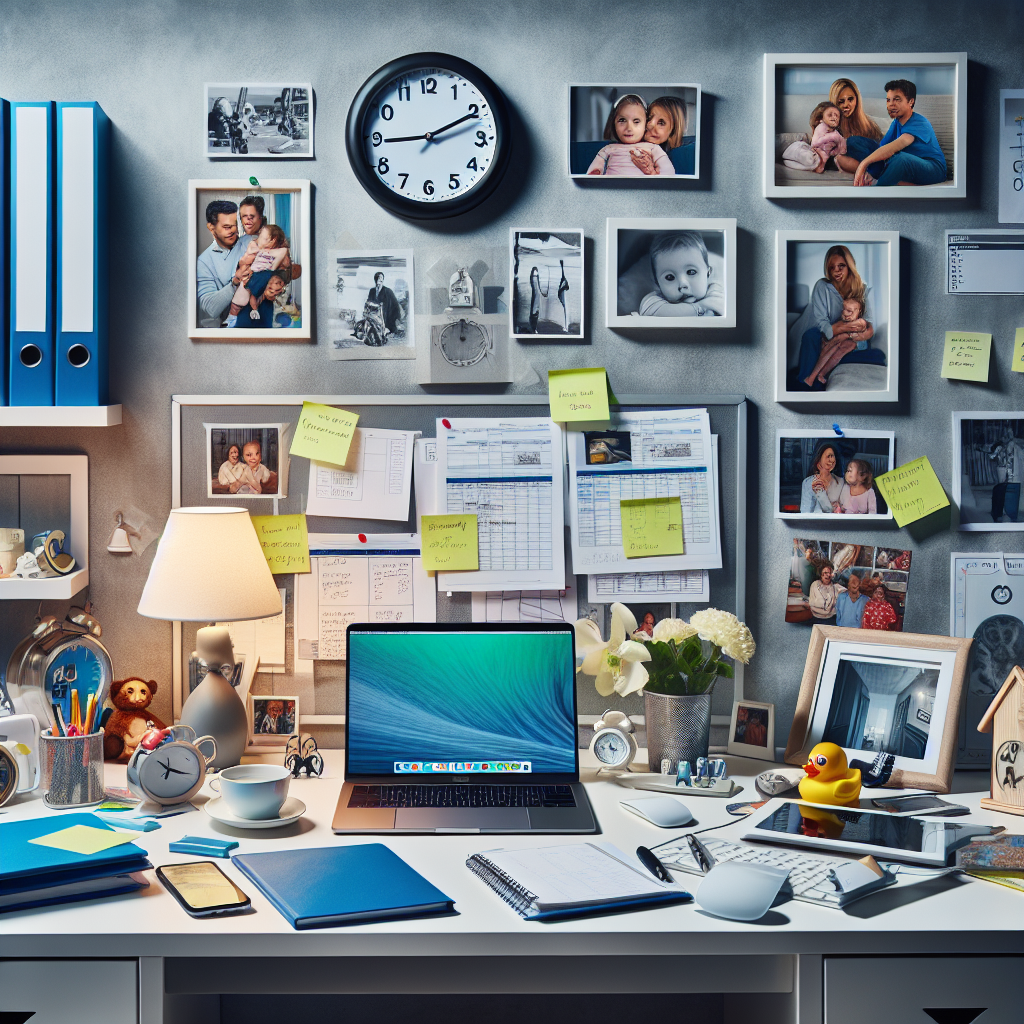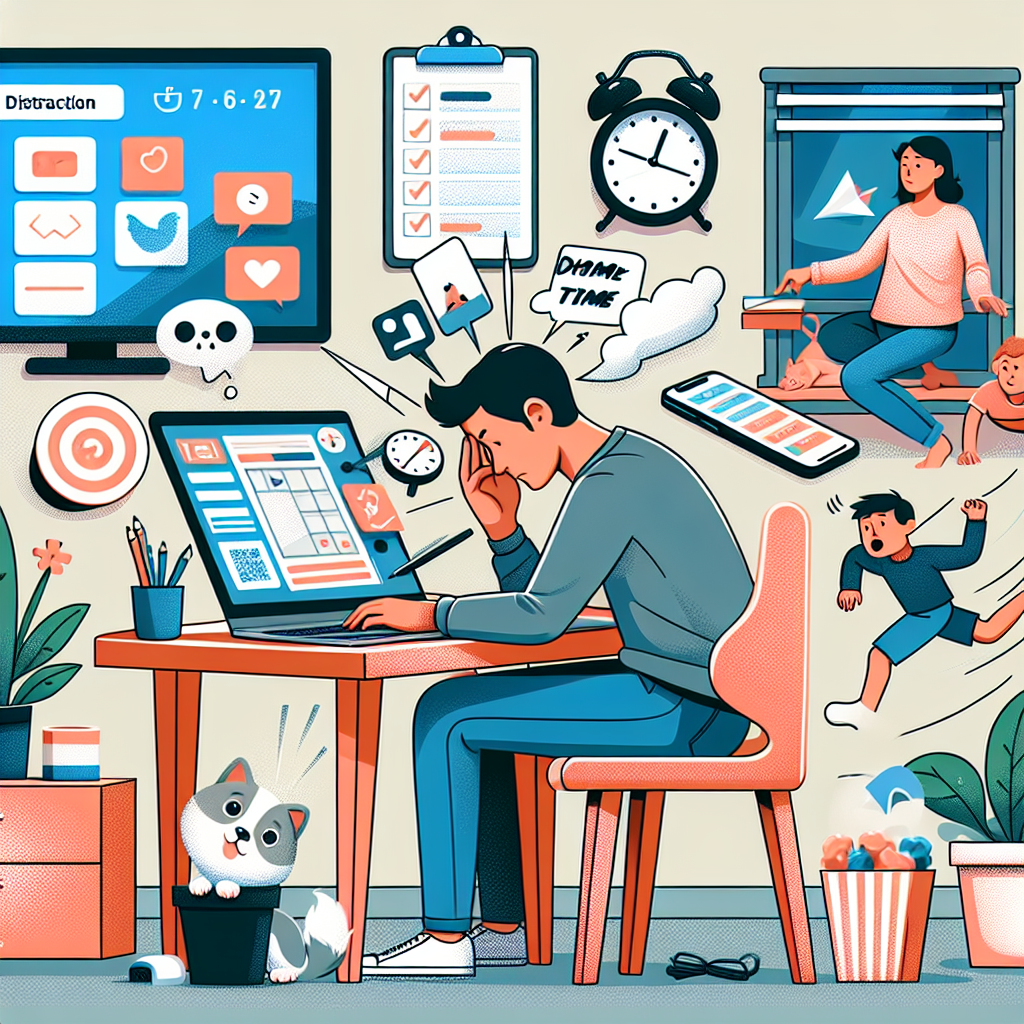Working from home offers many advantages, like the flexibility to set your own schedule and the option to work in your pajamas. However, it also comes with its fair share of challenges – distractions and time management being two of the biggest culprits. When you’re surrounded by the comforts and conveniences of home, it’s easy to fall into the trap of never-ending distractions that can hinder your productivity. Moreover, without the structure and routine of a traditional office setting, managing your time effectively becomes even more crucial. In this article, we’ll explore some practical tips and strategies to help you navigate these common work from home challenges, allowing you to maintain focus, increase productivity, and strike a healthy work-life balance.

Challenges of Working from Home
Introduction
Working from home has become increasingly common in today’s digital age. With advancements in technology and the rise of remote work arrangements, many individuals are experiencing the benefits and challenges of working from the comfort of their own homes. While there are numerous advantages to telecommuting, such as increased flexibility and reduced commuting time, it also presents unique challenges that can impact productivity and work-life balance. In this article, we will explore two major challenges faced by remote workers: distractions and time management, as well as provide helpful strategies to overcome them.
Distractions
One of the biggest hurdles when working from home is dealing with distractions. Unlike a typical office environment, the home is filled with numerous stimuli that can divert your attention away from work-related tasks. Identifying and managing these distractions is essential in maintaining focus and maximizing productivity.
Noise
Noise can be one of the most detrimental distractions when working from home. Whether it’s the sound of children playing, pets barking, or neighbors engaging in loud activities, excessive noise can disrupt concentration and hinder workflow. It is important to find ways to minimize or eliminate these auditory distractions.
Household Chores
Another challenge when working from home is the temptation to engage in household chores. With the constant presence of household tasks, it can be tempting to embark on cleaning, cooking, or organizing instead of focusing on work. This can lead to a loss of valuable time and a decline in productivity.
Personal Responsibilities
Balancing personal responsibilities with work obligations can also pose a challenge when working from home. Being in an environment that blurs the lines between work and personal life can make it difficult to prioritize and allocate time effectively. Juggling childcare, errands, and other personal obligations alongside professional responsibilities can be overwhelming without proper time management strategies in place.
Strategies to Minimize Distractions
Create a Dedicated Workspace
One effective strategy to minimize distractions while working from home is to establish a dedicated workspace. Designating a specific area solely for work can help create a psychological boundary between personal and professional activities. This can be a spare room, a corner in your living room, or even a well-organized desk. By having a dedicated space, you can train your brain to associate that area with focused work, which can help reduce distractions.
Set Boundaries with Family and Roommates
In a shared living situation, it is crucial to set boundaries with family members or roommates. Communicate with them about the importance of uninterrupted work time and establish clear guidelines for when you should not be disturbed. This can include using visual cues like a closed door or a “Do Not Disturb” sign to indicate that you are in work mode. By setting expectations and boundaries, you can minimize interruptions and maintain focus on your tasks.
Utilize Noise-Canceling Headphones
Noise-canceling headphones are another valuable tool for minimizing distractions. These headphones can block out external noises and create a bubble of silence, allowing you to concentrate on your work without being disturbed by environmental sounds. Whether it’s the sound of construction outside or background chatter from family members, noise-canceling headphones can help create a conducive working environment within the comfort of your own home.
Time Management Tips for Remote Workers
Establish a Routine
Establishing a routine is essential for effective time management when working from home. Without a regular schedule, it can be easy to lose track of time and procrastinate. Set a specific start and end time for your workday and stick to it consistently. This will help create structure and discipline within your remote work routine.
Set Clear Goals and Deadlines
Setting clear goals and deadlines is crucial to staying focused and prioritizing tasks. Start each workday by outlining the goals you want to accomplish and assign realistic deadlines to them. By breaking down your workload into manageable chunks and having a timeline to follow, you can maintain a sense of direction and achieve your objectives more efficiently.
Avoid Multitasking
While multitasking may seem like the key to productivity, it can actually hinder your performance when working from home. Constantly switching between tasks can lead to decreased focus and increased errors. Instead, focus on one task at a time and give it your full attention. By completing one task before moving onto the next, you can maintain productivity and prevent the accumulation of unfinished projects.

Importance of Self-Discipline
Self-Motivation
Working from home requires a considerable amount of self-motivation. Without the external pressures and structure of an office environment, it can be challenging to stay motivated and engaged in your work. Finding ways to motivate yourself, such as setting rewards for completing tasks or practicing positive self-talk, can help maintain your productivity levels.
Digital Distractions
Digital distractions, such as social media, emails, and notification alerts, can be significant barriers to productivity when working from home. It is crucial to establish boundaries with technology and limit your usage during designated work hours. Consider disabling non-essential notifications or using website blockers and productivity apps to help minimize the temptation of digital distractions.
Time Tracking Tools
Using time tracking tools can be incredibly beneficial in managing your time effectively when working from home. These tools allow you to monitor how much time you spend on different tasks, identify time-wasting activities, and make informed decisions about how to allocate your time more efficiently. By gaining insight into your work habits, you can make necessary adjustments to improve your overall productivity.
Benefits of Minimizing Distractions and Managing Time Effectively
Increased Productivity
Minimizing distractions and managing time effectively can significantly increase productivity when working from home. By eliminating external interruptions and allocating time strategically, you can accomplish more in less time. This can lead to a sense of accomplishment and satisfaction in your work, as well as increased efficiency and output.
Improved Work-Life Balance
Effectively managing distractions and time can also contribute to a healthier work-life balance. When you can devote focused time to work without unnecessary interruptions, you are more likely to complete your tasks efficiently. This allows you to create space for personal activities, hobbies, and quality time with loved ones, ultimately enhancing your overall well-being.
Reduced Stress
Distractions and poor time management can lead to increased stress levels for remote workers. By minimizing distractions and managing your time effectively, you can reduce stress and create a calmer work environment. This can enhance your ability to concentrate, maintain a positive mindset, and ultimately lead to a more fulfilling work-from-home experience.
Maintaining a Healthy Work-Life Balance
Establishing Work Hours
Establishing work hours is key to maintaining a healthy work-life balance when working from home. Define specific start and end times for your workday and stick to them consistently. Communicate your schedule to others and ensure they respect your designated work hours, allowing you to focus on your professional responsibilities and enjoy uninterrupted personal time.
Taking Regular Breaks
Taking regular breaks is essential for both physical and mental well-being when working from home. Incorporate short breaks throughout your workday to relax, stretch, and recharge. This can help prevent burnout, increase productivity, and improve overall focus and concentration.
Setting Limits on Work-related Communication
Setting limits on work-related communication is crucial in maintaining a healthy work-life balance. It can be tempting to be constantly available and responsive, especially when working remotely. However, establishing boundaries by specifying specific times when you will engage in work-related communication can help you achieve a sense of separation between work and personal life.
Dealing with Procrastination
Identifying Procrastination Triggers
Procrastination can be a significant obstacle when working from home, but identifying its triggers can help you overcome it. Reflect on the specific factors that lead to procrastination, such as feeling overwhelmed or lacking motivation, and develop strategies to address these challenges. By understanding your own procrastination patterns, you can take proactive steps to mitigate them.
Breaking Tasks into Smaller Steps
Breaking large tasks into smaller, more manageable steps can make them less intimidating and increase productivity. When faced with a daunting task, identify the individual components required to complete it and tackle each step one at a time. This approach allows you to make progress consistently and builds momentum towards accomplishing the larger goal.
Seeking Accountability
Seeking accountability from others can be a powerful tool in overcoming procrastination. Share your goals and deadlines with a trusted colleague, friend, or family member who can hold you accountable. Regular check-ins and progress updates can provide a sense of external motivation and help keep you on track.
Building a Supportive Work Environment
Communication with Colleagues
Maintaining open lines of communication with colleagues is essential for creating a supportive work environment when working from home. Regularly collaborate, exchange ideas, and seek advice from your teammates. This fosters a sense of connection, promotes productivity, and can help overcome feelings of isolation often associated with remote work.
Seeking Remote Work Resources
When faced with challenges while working from home, it is beneficial to seek out remote work resources. Online forums, industry-specific communities, and virtual conferences are great platforms to connect with other remote workers, share experiences, and gain valuable insights. Leveraging these resources can provide a support network and a wealth of knowledge to navigate the challenges of remote work.
Maintaining Social Connections
Working from home can sometimes lead to feelings of loneliness and isolation. Actively make an effort to maintain social connections with friends, family, and colleagues. Schedule virtual coffee breaks, engage in online social activities, or participate in virtual team-building exercises. Nurture relationships and foster a sense of community to enhance your overall well-being while working remotely.
Conclusion
Working from home offers numerous advantages, but it also presents challenges that can impact productivity and work-life balance. By addressing distractions, implementing effective time management strategies, and maintaining self-discipline, remote workers can minimize distractions, increase productivity, and find a healthy balance between their personal and professional lives. Remember, it is essential to create a conducive working environment, set clear goals, and seek support when needed. By doing so, you can overcome the challenges of remote work and thrive in your work-from-home journey.
